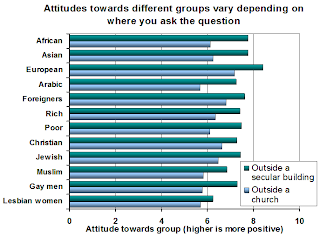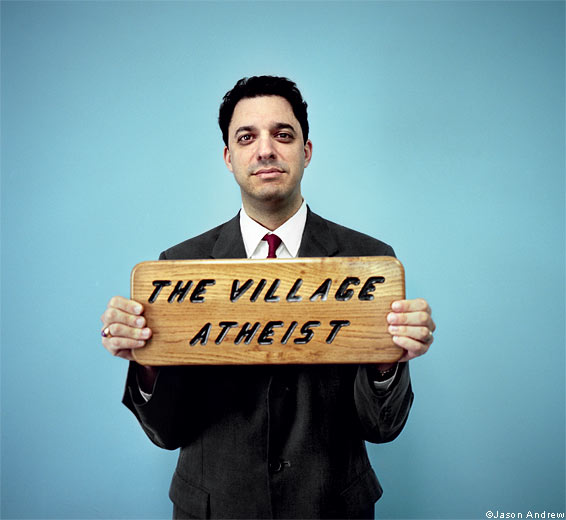By PRESI MANDARI - JAKARTA GLOBE
Added: Tue, 07 Feb 2012 18:58:33 UTC
Change.org petition
Atheist Alliance Legal Support Fund
A defiant declaration of atheism by an Indonesian civil servant has inflamed passions in the world’s most populous Muslim nation, pitting non-believers and believers against each other.
The trouble began when civil servant Alexander Aan posted a message on the Facebook page of Atheist Minang, a group of Indonesians with godless beliefs. It read: “God doesn’t exist.”
The post so enraged residents in Aan’s hometown of Pulau Punjung in West Sumatra province that an angry mob of dozens stormed his office and beat up the 30-year-old.
To add insult to injury, police then arrested him and now want to press blasphemy charges that could see him locked up for five years.
Muslim extremists have called for Aan to be beheaded but fellow atheists have rallied round, and urged him to stand by his convictions despite the pressure.
“Dear Alex, stick to your beliefs. This country has no right to restrict your faith,” Fahd Singa Diwirja wrote on the same Facebook page, where Aan is one of the administrators.
“You’re facing narrow-minded people, but this is the true Indonesia, a fertile ground for the spread of fundamentalism,” Diwirja added, advising Aan to escape persecution by seeking asylum in a European country.
Aan has also gained the support of the US-based International Atheist Alliance.
The group, together with Atheist Minang, has written to President Susilo Bambang Yudhoyono, calling on him to ensure that the blasphemy allegations are dropped.
“This is a law that has been used to promote mob violence and intimidation against those who do not agree with ... vigilante groups,” said the letter, copies of which were also sent to the United Nations and Human Rights Watch.
Aan’s proclamation has been removed from the page, but the Facebook group has doubled to 2,000 since the controversy made local news reports.
Most of the postings, however, are diatribes against Aan and his supporters.
“These atheists should be beheaded, that’s what they deserve,” wrote a man who identified himself as Putra Tama, a Muslim from neighboring Jambi province.
Other posts challenged atheists from the group to dare show themselves, instead of hiding behind the anonymity of social media.
“If you think your arguments are true, why don’t you just have a face-to-face meeting with us, people who still believe in God? You’re just a group of cowards,” taunted a post by another Muslim.
Although Indonesia’s constitution guarantees freedom of religion, it only recognizes six faiths: Islam, Buddhism, Hinduism, Catholicism, Protestantism and Confucianism.
Perceived blasphemy against any one of these religions carries a maximum five-year jail term.
Read more
TAGGED: ATHEISM, HUMAN RIGHTS

Santorum and the Health Insurance Mandate




 1) We applied last year and got rejected. We applied again this year and just recently got our second rejection letter a couple weeks ago. Two of my fellow classmates and I were the ones who put together the club proposal, wrote up our constitution, etc., but on our unofficial club email list (which we use to send emails about meetings we hold once every other week or every two weeks) currently has 50 people on it - not that they all show up for all of the meetings, but they have all at least expressed enough interest in our group to wish to be on our email list. The rejection letter this year essentially said the same thing as last year, focusing on the fact that we had failed to get the approval of Campus Ministry, despite the fact that we did in fact get the approval of the Philosophy Department, as the University insisted that Campus Ministry, rather than the Philo Department, was the "appropriately impacted department..."
1) We applied last year and got rejected. We applied again this year and just recently got our second rejection letter a couple weeks ago. Two of my fellow classmates and I were the ones who put together the club proposal, wrote up our constitution, etc., but on our unofficial club email list (which we use to send emails about meetings we hold once every other week or every two weeks) currently has 50 people on it - not that they all show up for all of the meetings, but they have all at least expressed enough interest in our group to wish to be on our email list. The rejection letter this year essentially said the same thing as last year, focusing on the fact that we had failed to get the approval of Campus Ministry, despite the fact that we did in fact get the approval of the Philosophy Department, as the University insisted that Campus Ministry, rather than the Philo Department, was the "appropriately impacted department..."
 The Archbishop of Canterbury and atheist Professor Richard Dawkins are set to go head to head to discuss man's greatest question.
The Archbishop of Canterbury and atheist Professor Richard Dawkins are set to go head to head to discuss man's greatest question. "This is an unprecedented finding. Previously, the best existing treatment for Alzheimer's disease in mice required several months to reduce plaque in the brain."
"This is an unprecedented finding. Previously, the best existing treatment for Alzheimer's disease in mice required several months to reduce plaque in the brain." Three US citizens who lost their sight in childhood have reported a dramatic improvement in vision after having gene therapy in both eyes.
Three US citizens who lost their sight in childhood have reported a dramatic improvement in vision after having gene therapy in both eyes.
 America and Eurasia will crash into each other over the North Pole in 50-200 million years time, according to scientists at Yale University.
America and Eurasia will crash into each other over the North Pole in 50-200 million years time, according to scientists at Yale University. "It is as if it has just been blasted off Mars. It is effectively a pristine sample of Mars."
"It is as if it has just been blasted off Mars. It is effectively a pristine sample of Mars." Tensions between religion and science will persist unless believers recognise that skepticism is a hallmark of science.
Tensions between religion and science will persist unless believers recognise that skepticism is a hallmark of science.



 A "treasure trove" of fossils - including some collected by Charles Darwin - has been re-discovered in an old cabinet.
A "treasure trove" of fossils - including some collected by Charles Darwin - has been re-discovered in an old cabinet. The HMS Beagle Project is seeking a port in the UK where a modern replica of the ship that carried Darwin on his famous voyage will be built.
The HMS Beagle Project is seeking a port in the UK where a modern replica of the ship that carried Darwin on his famous voyage will be built.





